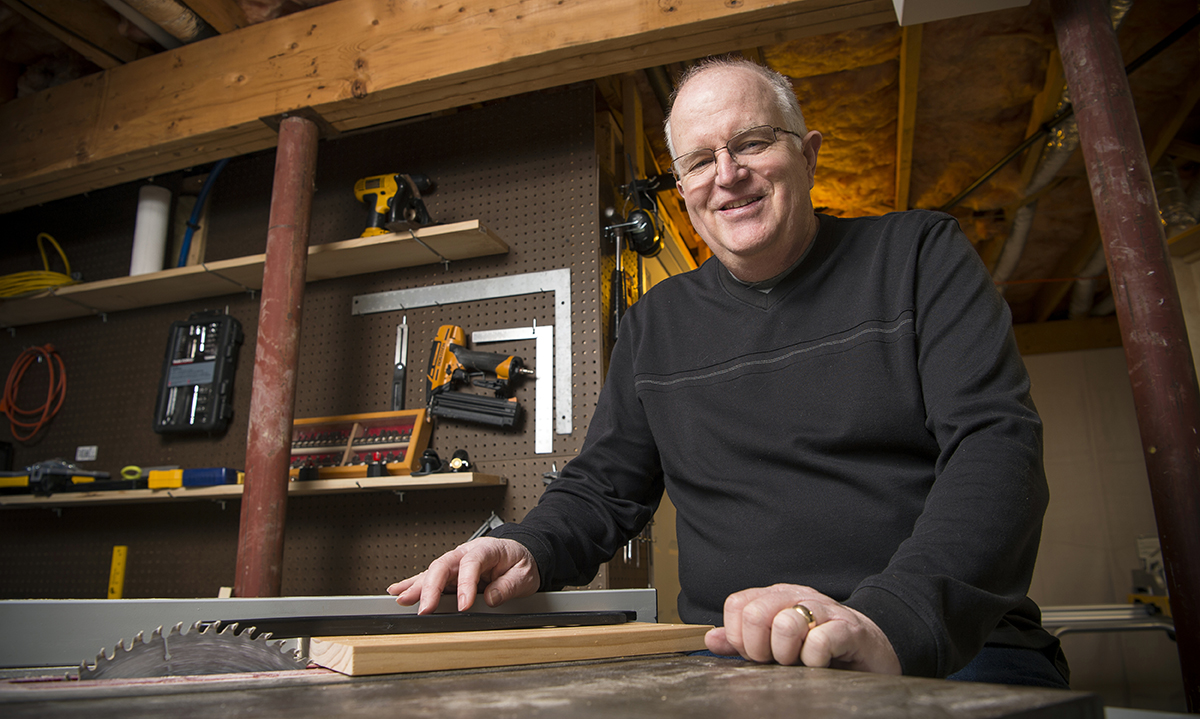05/11/2016
Jim's Story: "Don't Be a Fool Like Me"
May 18, 2015, was like any other day for Jim Lawson. Just like other Mondays before, he was preparing for an evening council meeting (he sits on the town council in Durham), going over notes and ensuring he was well-prepared for discussions on town topics. These meetings can be stressful, as he later shared, and that day it was no different.
Until he started having problems with his right hand.
It was a strange sensation, and he was having trouble typing, something he had done routinely, as we all do with today’s computerized technology. Reflecting back, he said, he should have stopped right there, not tried to analyze the issue or make excuses for what was happening. He should have headed straight to the hospital.
But he didn’t. Like many before him, he shrugged it off and went on with his day.

If you have ever been to a town council or board of selectmen meeting, you know these can often go on for several hours and can be stressful for the participants – as was the case for this particular meeting.
Discussions took the meeting late into the evening. Throughout the meeting Jim noticed the problem with his hand continued to worsen. He also noticed he was having trouble connecting his thoughts to his words. He was struggling.
“I knew something was wrong. My speech wasn’t slurring, but it was different,” said Jim. “I was word finding. It was choppy. I knew my speech wasn’t right.”
Again, he shrugged it off, ignored the symptoms and persevered through the meeting – even masking his symptoms so others wouldn’t notice. There were two physicians at the meeting that night, but he didn’t want to trouble anyone. Rather than signal for help, he continued on as if nothing was wrong.
In fact, something was wrong. Jim Lawson was having a stroke.
“Something didn’t feel right. I knew it was bad, but it didn’t signal to me that it was bad enough to interrupt my day. I had things to do, and I didn’t want this to get in the way. Looking back, I was making excuses.”
He was ignoring his symptoms and losing precious time. When a stroke happens, getting treatment right away gives patients the best possible chance for a good outcome. Experts recommend treatment within six hours of the onset of symptoms.
After a long, three-hour meeting, Jim was still not feeling better, but he didn’t opt to drive himself to the hospital or seek treatment. Instead he went home. His wife was already asleep by this point. He didn’t want to wake her – and worry her – so he just climbed into bed and went to sleep.
Time is Brain
Jim’s stroke [later identified as an ischemic stroke] occurred as a result of an obstruction within a blood vessel supplying blood to his brain. Deprived of oxygen and other nutrients, his brain was suffering damage and sending signals that something wasn’t right.
But he wasn’t listening to the signals. The six hour window was closing, quickly. He was ignoring his symptoms and losing precious time. The next morning, Jim fell trying to get out of bed, but even that did not prompt him to get treatment.
At this point, the six hour window had vanished.
In fact, it wasn’t until later that afternoon, when he took his blood pressure using a home kit and saw that it was extremely high, that he finally decided to see a doctor.
He drove himself to Wentworth-Douglass Express Care in Lee – close to 24 hours after the onset of symptoms – and almost collapsed at the registration desk. The team there immediately evaluated him, and suspecting a stroke, transferred him to the emergency department at the hospital within minutes.
The care he received at both Express Care and the emergency room was phenomenal, he said. “They were the experts, and I was the fool. If I hadn’t ignored my symptoms, my outcome could have been that much better.”
After the Wentworth-Douglass Stroke Team stabilized him, evaluated his options and provided treatment, Jim spent five days at Wentworth-Douglass Hospital and several weeks at a rehabilitation facility. His team of caregivers included physicians, nurses, physical therapists, occupational therapists, speech pathologists and more.
“The care I received was top-notch from all involved. They included me and my family in all of the care, explained everything they were doing and made me feel as if no one else was there. They were my care team.”
Jim has recuperated well, but his outcome could have been far worse. He still deals with some aftereffects. He had to learn how to write again and relearn how to formulate word patterns and deal with everyday stress.
“You don’t get to get on with life as it was. It’s not the same. It’s redesigned,” he said. “But I’m persevering.”
In fact, Jim has taken up a new hobby – furniture making. It helps with his concentration and hand-eye coordination. He still sits on the town council in Durham, though he is contemplating taking a less stressful role.
He’s happy to be here and to be able to talk about his experience. His hope is to help someone else who is reading this and struggling with similar symptoms.
“I wish I could rewrite the script,” he said. “All the things I could have done, I didn’t. If this was happening to a family member or friend, I would have intervened right away. But for me, I ignored my symptoms because I had somewhere to be. Don’t be a fool like me.”
We agree. Know the signs and symptoms of stroke and know that time matters. The sooner you get treatment, the better your chance for a positive outcome.
For more information about the signs and symptoms of stroke, visit Stroke Care.